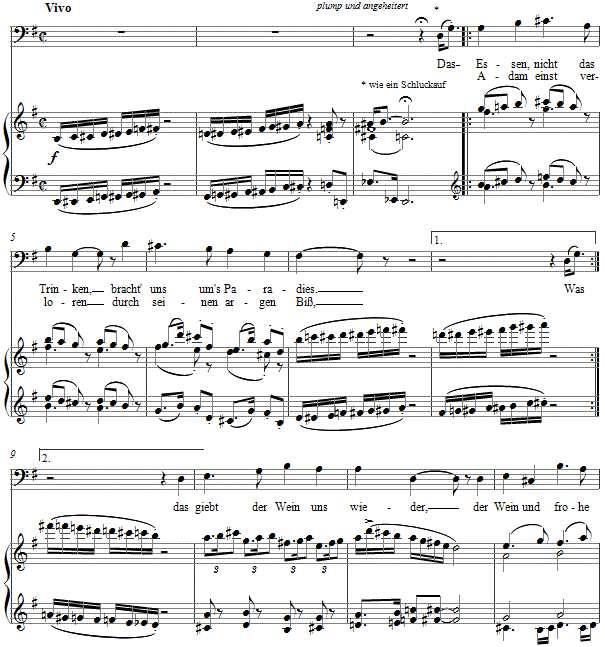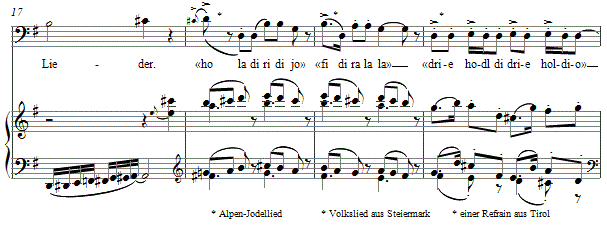Music and Texts of GARY BACHLUND
Vocal Music | Piano | Organ | Chamber Music | Orchestral | Articles and Commentary | Poems and Stories | Miscellany | FAQs
Die Arche Noäh - (2012)
Wilhelm Müller
bass or baritone and piano
Das Essen, nicht das Trinken,
Bracht' uns um's Paradies.
Was Adam einst verloren
Durch seinen argen Biß,
Das giebt der Wein uns wieder,
Der Wein und frohe Lieder.
«ho la di ri di jo» [ 1 ]
«fi di ra la la»
«dri-e hodl di dri-e hol-dio»
Und als die Welt auf's Neue
In Bauches Lust versank,
Und in der Sünde Fluthen
Die Kreatur ertrank,
Blieb Noah doch am Leben,
Der Pflanzen edler Reben.
«ho la di ri di jo»
«fi di ra la la»
«dri-e hodl di dri-e hol-dio»
Er floh mit Weib und Kindern
Wohl in sein größtes Faß,
Das schwamm hoch auf den Fluthen,
Und Keiner wurde naß,
So hat der Wein die Frommen
Dem Wassertod entnommen.
...das giebt der Wein uns wieder,
Der Wein und frohe Lieder.
«ho la di ri di jo»
«fi di ra la la»
«dri-e hodl di dri-e hol-dio»
Und als die Fluth zerronnen,
Da blieb das runde Haus
Auf einem Berge sitzen,
Und alle stiegen aus,
Begrüßten froh das Leben,
Und pflanzten neue Reben.
«ho la di ri di jo»
«fi di ra la la»
«dri-e hodl di dri-e hol-dio»
Das Faß blieb auf dem Berge
Zum Angedenken stehn:
Zu Heidelberg am Neckar
Könnt ihr es selber sehn.
Nun wißt ihr, wer die Reben
Am Rhein uns hat gegeben.
«ho la di ri di jo»
«fi di ra la la»
«dri-e hodl di dri-e hol-dio»
Und will noch Einer wagen,
Den heil'gen Wein zu schmähn,
Der soll in Wasserfluthen
Erbärmlich untergehen!
Stoßt an und singt, ihr Brüder:
Der Wein und frohe Lieder!
«ho la di ri di jo»
«fi di ra la la»
«dri-e hodl di dri-e hol-dio»8 pages, circa 4' 45"
Wilhelm Müller
Noah's Ark
Our meals yet not our drink
Were brought from paradise.
What Adam once had wasted
When Eve's apple did entice
Was given back by heady wine
And merry songs that intertwine.
Once man's new earth was sunk
By the joys of eating crowned,
The flood would wash away man's sin
As creatures by it were drowned.
But dear old Noah did survive,
And did our grapes vines keep alive.
He fled with wife and family,
Sailing in an ark-shaped vat
Which floated o'er flooding waters,
And none got wet from that.
By this did wine for us live on
Till watery death became dry dawn.
And as the flood abated,
The great round house alit
So all could come ashore
And upon that mountain sit,
To greet anew with cheery hoots
And plant their vineyards' tender shoots.
That vat upon the mountain
Stands as monument this day;
Yet in Heidelberg on the Neckar
We see something like it, anyway.
So understand this then, a story fine,
How came our grapes along the Rhine.
If even one would err with bile
Our sacred wine so to revile,
He should sink in flooding waters
To wash away the smirk or smile.
So brethren, raise your glasses:
For wine and song all surpasses!
rhymed paraphrase by the composer
Copyright 2012 © Gary Bachlund All international rights reserved.
Wilhelm Müller (1794-1827) was a poet, prose writer, translator, critic, editor, soldier and more, born in the then duchy of Anhalt-Dessau. He was educated there and at the University of Berlin. In 1813-1814 he volunteered for the Prussian army in the war against Napoleon, fighting in the battles of Lützen, Bautzen, Hanau and Kulm. In 1819, he was appointed teacher of classics in Dessau, and in 1820 librarian to the ducal library because he was supported by the family through most of his life. Remembered today for the poems set to music by Franz Schubert in Die schöne Müllerin and Die Winterreise, he more influential than this in that era. A supporter of the Greeks in their fight for independence against the Turks, he also collected and edited Italian and modern folk songs. It is surmised that Goethe became acquainted with Marlowe's Doctor Faustus through Müller's 1818 translation. For myself having in my early years sung many lieder to Müller's texts including Die schöne Müllerin, it seemed an amusing notion to include some musical references to the cycle in this work, as well as to make musical reference to the Neckar through an appreciative parody of the theme from Mahler's Rheinlegendchen. Because the text erects a fine myth about the joy of wine over the biblical tale, it is recommended that a performer "enact" the song with a soupçon of playful inebriation, if so inclined to do.
The inclusion of nonsense syllables is intended to make musical the mention of "frohe Lieder" at the end of the first strophe and later. For these nonsense syllables I chose those as found in the article mentioned below. The references are also explained with asterisks in the setting itself.
The score is available as a free PDF download, though any major commercial performance or recording of the work is prohibited without prior arrangement with the composer. Click on the graphic below for this piano-vocal score.
NOTES
[ 1 ] The nonsense syllables used in the refrain are drawn from folk materials, not from Müller's text.
For the German language which extends beyond the borders of modern Germany, these phrases come from 1) from Alpine yodeling, 2) from a folk song in the Steiermark region of Austria, and 3) from a folk song noted as from Salzburg, as well as the Tyrol and Bayern.
For those interested in greater detail, the source for these German nonsense phrases is: "Musical Pitch in Nonsense Syllables: Correlations with the Vowel System and Evolutionary Perspectives," by Gertraud Fenk-Oczlon and August Fenk, in the Proceedings of the 7th Triennial Conferences of European Society for the Cognitive Sciences of Musiv (ESCOM 2009), Jyväskzlä, Finland.


